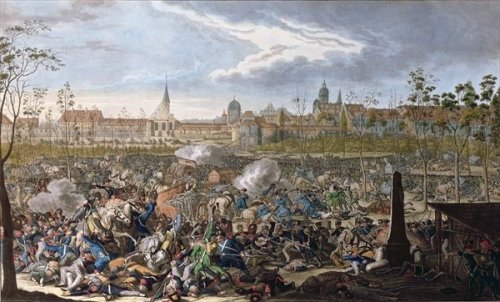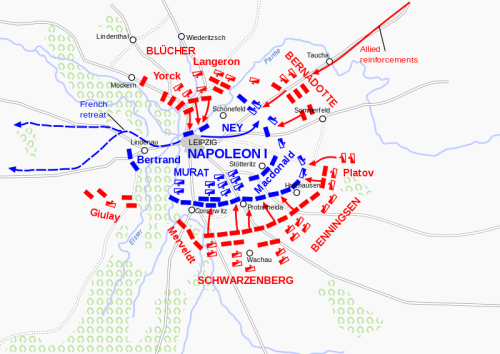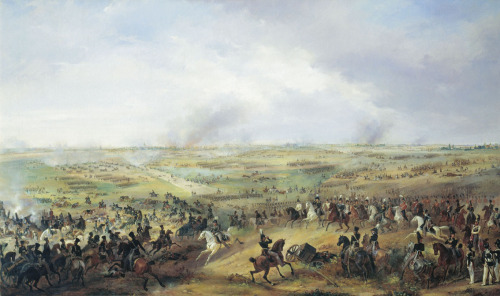The Largest Battle Before the 20th Century — The Battle of Leipzig 1814.After the disastrous d
The Largest Battle Before the 20th Century — The Battle of Leipzig 1814.After the disastrous defeat of Napoleon’s Army in Russia during the winter of 1812/1813, Europeans began to realize that Napoleon’s Grande Armee was not invincible. In fact at that time Napoleon’s Army and Empire was quite vulnerable. As a result many nations that were allies or puppets of France rebelled against his rule. A new coalition was formed called the Sixth Coalition, which was comprised of Russia, Austria, Great Britain, Prussia, Spain, Portugal, and Sweden. Overall total Coalition Forces exceeded a million men, while Napoleon’s total forces had shrunk to around 300,000. Napoleon’s forces were disintegrating as well, as shortages of food, equipment, and weapons caused French troops to desert. By then manpower shortages forced the French Army to recruit children and old men to fill in the ranks.Sensing Napoleon’s weakness Coalition nations formed a massive army comprised of 380,000 troops from Russia, Prussia, Sweden, and Silesia to oust Napoleon out of Germany. By contrast Napoleon’s forces totaled 225,000 men, mostly from France but also allies from Italy, Germany, and Poland. In addition coalition forces sported over 1,500 cannon, more than twice as many available to the French Army. Overall 605,000 men would take to the battlefield near the German City of Leipzig on the 16th of October, 1813. Soldiers from all over Europe participated, and the Battle of Leipzig would prove the be the largest battle ever fought in human history up to that point, a record which would not be broken until World War I.Incredibly though heavily outnumbered Napoleon immediately took the offensive in an attempt to drive away the Coalition Forces. Coalition Forces were very disorganized as member nations did not always get along and the Coalition High Command was riddled with petty rivalries. Napoleon hoped to take advantage of this in an aggressive assault to divide and conquer the enemy. Unfortunately for Napoleon, despite utilizing very brilliant tactics Coalition numbers proved too much and forced him to fall back.Over the next three days the battle settled into a siege as Napoleon tried to hold strategic ground while Coalition forces slowly surrounded his positions. While the French conducted a brilliant defense, Coalition numbers overwhelmed the French Army forcing it to fall back. Even more devastating was the Coalition’s 1,500 gun artillery force, which easily battered away any French fortifications that stood in the way of the Coalition assault.As the Battle of Leipzig raged on Napoleon’s Army had the curious habit of shrinking as the allies of the French reexamined their priorities and loyalty. Many of the allies of the French were not necessarily loyal friends but puppet states ruled by Napoleon. By the second and third day of the battle, thousands of Italian, Polish, and German troops either deserted or defected. The most notable instance of defection occurred on the third day when 5,400 Saxon troops defected en masse to the Coalition. At first it appeared as though the Saxons were conducting an assault on Coalition lines. But as the Saxons approached the Coalition, they made an about face, joining ranks with the Prussian Army in an attack on the French.By the end of the third day of the battle it was becoming apparent to Napoleon that he was going to lose as Coalition forces had almost surrounded the French Army. In a last ditch attempt to salvage the situation Napoleon sued for peace, offering an armistice and peace talks if the Coalition allowed his army to retreat. Coalition leaders rejected the offer. On the fourth day of the battle Napoleon withdrew most of his forces out of Leipzig, destroying the only bridge over the Elster River to cover his retreat. Unfortunately due a mistake in timing, the bridge blew as thousands of French soldiers were crossing it. Thousands of French troops were trapped, and the leader of Polish forces, Prince Jozef Poniatowsky, drowned in the Elster River after sustaining a number of wounds while refusing the surrender.Overall the Battle of Leipzig would prove to be the bloodiest battle of the Napoleonic Wars, and among the bloodiest battles in history. Coalition forces lost 54,000 men while Napoleon suffered 44,000 dead and another 36,000 captured. The Battle of Leipzig also broke the back of Napoleon’s Empire, forcing him to retreat back to France and surrender his control over Germany, Poland, and Italy. Worse yet British forces had managed to oust the French Army from Spain and were preparing an invasion of southwestern France. Napoleon’s once mighty French Empire, which had previously spanned across most of Europe, had been reduced to the borders of France itself. By 1814 Coalition forces would conquer France and force Napoleon into exile at Elba Island. -- source link
Tumblr Blog : peashooter85.tumblr.com
#history#napoleonic war#napoleon#sixth coalition#battle#war#napoleon bonaparte#french army#grande armee#leipzig#battles



